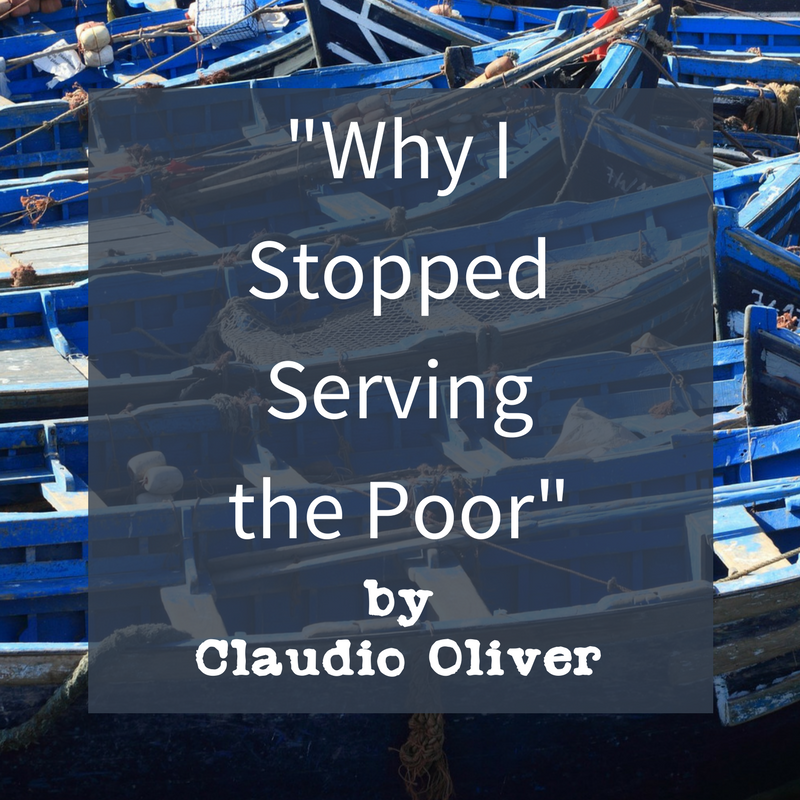 The following is from my 9-minute talk at the Q Conference: There is a daughter I mother A daughter I love But she is not mine & I am not hers, Forever. There is a mother she loves A mother who loves her, Forever. For love is like water. No human border can keep it out. Yes, love is like water It moves above in clouds, & below in soil Yes, love is water. In February 2018, I became a foster mom to a 5-year-old Honduran girl, Julia, who had been labeled an unaccompanied minor when she crossed into the U.S. But she wasn’t unaccompanied. In October 2017, she along with her mother, Lupe, and stepdad, Carlos, were at the mercy of the smugglers they paid $7,500 to as they journeyed from Honduras through Guatemala and up through Mexico to arrive at the US. But at the last stop in northern Mexico, the smugglers took Lupe, the mother, as a hostage. Julia and Carlos crossed the Rio Bravo, but Lupe stayed behind, and was exploited sexually. It’s unclear why Customs & Border Protection separated Julia from her stepdad after processing them. Carlos was deported, and Julia was placed into a sponsorship family. A few months later, Lupe, the mother escaped the smugglers and returned to her home in Honduras about the same time that little Julia entered foster care due to neglect from her sponsorship family. Over a period of four months, with the creative and determined help of local social workers, the Honduran Consulate, and my family… in July of 2018, my husband Andrew and I traveled with Julia back to Honduras. At the airport, when Julia saw her mother, she gleefully ran through the automatic doors. Lupe scooped her up and Julia laid her head on her mother’s shoulder, letting tears fall as her mother’s arms enveloped her. Wordless groans and squeezes communicated a love—a longing—a thirst—too deep for words. Eight months apart was eight months too long. It was an incredibly beautiful and heartening reunification, complete with an Elsa-themed welcome-home party. If you don’t know who Elsa is, ask any 5-year-old girl. But be careful, you may get an unwanted song stuck in your head. Love is like water after a long, hard battle with red tape working to undo what our government is responsible for. 2,737 children were forcibly separated from their parents when they crossed into the U.S. under the zero-tolerance policy between April and June of 2018. Reports are now showing thousands more had been separated prior to April, and more had been separated after June. Love is like water no human border can keep it out. But,
Are just some of the ways love has been contaminated by a source that SHOULD NOT have access to it. Forced separation causes lifelong trauma for both children and parents. We don’t want to admit how familiar all of this is in America. African Americans, Native Americans, Asian Americans and Latino Americans have all suffered forced family separations at the hands of OUR government. Beyond the zero-tolerance policy, families are separated every time ICE deports a parent, leaving behind children. I had an opportunity to visit an immigration detention facility in the fall of last year. There, I met another immigrant mother, Jovita. In front of her 6 and 8-year-old American daughters, Jovita was handcuffed by ICE and taken away from her decade-long home in Alabama. Her 8-year-old has since tried to commit suicide, in constant fear that ICE will come for her father just as they came for her mother. In response to family separations my friend and poet Carolina Hinojosa-Cisneros wrote a poem called Blessed Be the Mother. This is a small portion of her words: On holy land, between a mesquite shrub And a Mexican willow whose purple buds bow In adoration, a mother sets out on a pilgrimage… On holy land, between a tent city in Tornillo And the lurking eyes of government institutions, She prays her rosary, beads she must recall by faith Since their confiscation at port of entry… Blessed be the mother who spreads her wings in resistance. Blessed be the mother who reclaims her land. Blessed be the mother who meets the devil nose to nose until her hijitas and hijitos are returned to her. Bendita sea la madre. These pilgrimages don’t always end in reunification. Bodies are beaten and broken when mothers try and try to cross a border fighting to bring life to the lives they brought into this world. As Christians in the United States, we must look at the holy ground of our southern border. We must look and lament. [pause] At my work, we talk a lot about the UNCONSCIOUS stories that guide our behavior. The question is, deep in our core, what do we believe a human being is? If human beings are only their souls, then we can justify ANYTHING done to the bodies of our neighbors. Concerning ourselves only with eternal salvation, we become complicit in state- and church-sanctioned acts of dehumanization. If human beings are only their economic worth, we then dehumanize our neighbors and ourselves as we filter the world through a scarcity mentality. WE, the followers of the God of communal abundance —the God of Jubilee— FEARFULLY decide there’s not enough to go around. The Good News, the whole gospel of the kingdom of God, is that Jesus is making all things new. Christ — being fully God and fully man — breathes abundant life into our humanity. He is the Good news to the poor, freedom to prisoners, freedom to the oppressed. We must not forget that the body of Christ our King was beaten and bruised and broken as he fought to bring abundant life and light into this world. King Jesus is The King of the Broken. We are ALL broken, All seeking to flourish All desperate for neighbors who seek our flourishing All called to be neighbors who seek the flourishing of others. Yes, love is water Love is Living Water And we are all thirsty.
1 Comment
 The mentality of scarcity—maybe a spirit of scarcity—prowls like a lion seeking to devour us. The God of communal abundance, the God of shalom, is calling us out of its clutches. The foundation of holistic poverty equates to broken relationships. At my work, we often reference a figure of the four broken relationships that can be found in Walking With the Poor by Bryant Myers. Those relationships include with God, Self, Others, and Creation. “Poverty is a result of relationships that do not work, that are not just, that are not for life, that are not harmonious or enjoyable. Poverty is the absence of shalom in all its meanings,” Myers says. (Walking With the Poor, p. 86) With this in mind, I believe that discipleship at its core is a process for us to become more whole — that is, for our relationships to be reconciled. Therefore, this mentality of scarcity that seems to keep bobbing its head in many of the discussions I have with others is not new news. If poverty is unreconciled relationships that cause us to not be whole human beings, then the enemy that prowls around like a lion seeking whom he can devour will constantly want us to perceive that someone else is trying to take that wholeness away from us. He must pit us against our neighbor, the very neighbor God calls us to love. You see, if the enemy can convince me that my neighbor is going to take away that which I’ve worked hard to obtain in my process of becoming whole, then in my attempt to seek wholeness, I will also hoard the stepping stones toward it. And if I hoard what I perceive as a means to the end of wholeness, then I will never actually arrive at my destination of becoming whole. In their book Becoming Whole, Brian Fikkert & Kelly M. Kapic argue that we, dominant-culture American Christians, have been leaning into a theology that is essentially Evangelical Gnosticism that idolizes the American Dream. They say, “the goal isn’t to live the American Dream now and get our souls to heaven later. The goal is to become whole.” We have become an easy target for the prowling enemy. As we continue to seek what we think is wholeness through stepping stones that are made quite slippery by the American Dream, we easily fall prey to the ideas that the tangible & intangible things—titles, certificates, retirement money, discounts on products that require cheap labor, citizenship, power, privilege—will lead us to wholeness, but we must protect them at all costs. And so we see this mentality of scarcity affect each of us: whether it’s in the power dynamic between genders and races both inside and outside of the Church, the argument against immigration, the movement out of public schools, the silencing of sexual abuse victims (or even highlighting of them when we want to on our terms). When we take a step back, we can clearly see this mentality of scarcity influences all of us. None of us is immune to scarcity. Some because of trauma. Some because of power. Some because of privilege. Some because of oppression. All because we are human. But the God of shalom, the God of communal abundance calls us out of the clutches of this lie. He, through gleaning and jubilee and downward mobility and community reconciliation calls us to a place where we see first and foremost that He is enough. Yes, God is enough. Jesus is enough. No Christ didn’t come riding on a white horse slashing oppression by being oppressive like we all wanted him to. But Christ, who deeply knew what it was to be human and fully understood suffering is enough. And once we see that Christ is enough, we also see that we are enough. Not only in our limited humanity, but also in our communities. We don’t need more stuff—tangible or intangible. We don’t need more human, greedy power. We are enough. Our humanity is enough. We are allowed to honestly confess the ways we hurt each other. We make space for difficult truths to be told because we see each other as human beings first. We don’t judge, we confess. And in our confession we find God-ordained empathy for our neighbors we thought were our enemies. Finally, we see that the American Dream is NOT enough. We don’t need it. It’s not enough because it doesn’t make us whole. It’s individualized and doesn’t take into consideration the systems of oppression we have built our country upon. We’ve proven that becoming richer makes us less happy (Becoming Whole, Introduction). The mentality of scarcity is combatted by a mentality of community. “We’ve lost the sense that we are all in this together, that my flourishing is bound up with yours, and that we’re called to love our neighbors as ourselves.” (Becoming Whole, Ch. 3). So wherever you live, whatever you do ... find your community and press in, lean in, and bind yourself up with your neighbors. I'll work on doing the same. |
Gena's
|

 RSS Feed
RSS Feed

